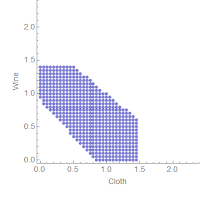Yesterday was this blog's 3rd birthday. The real celebration will come at the end of this week with the release of GDP data from the BEA. In the meantime, there are a couple of updates:
For the book, I've reached 10,000 words -- a third of my 30,000 word goal. It's turning into a pretty strong indictment of economics in general.
On the blog, I updated the comparative advantage post which has gotten a bit more interesting.
Here's a list of the top posts (by pageviews) of all time:
Mar 3, 2016
Not only did my criticism of the Stock-Flow Consistent (SFC) approach top the pageviews, it topped the list of the greatest number of comments (at over 200).
Jun 19, 2015
My criticism of Scott Sumner's "proof" of monetary offset and that fiscal stimulus has no impact also kicked up a hornets' nest.
Apr 7, 2015
I tried to get a quick summary in front of Mark Thoma because he had just written an article that seemed to be a RFP for the information equilibrium model.
May 16, 2015
Paul Romer makes the same mistake Robert Lucas makes, which began my slow realization that economists don't understand that infinity is dimensionless.
Jan 25, 2016
My reductio ad absurdum model. Inflation is directly linked to labor force participation growth.


Congratulations on the birthday of your blog Jason!
ReplyDeleteO/T: I notice that Brian Romanchuk says that Anwar Shaikh also uses an ideal gas analogy in his book.
Hi Tom,
DeleteThat's interesting ... actually I'd broadly agree with the points 1-5:
1. "It should be rooted in some theory of the relevant factors at the micro level."
Given #2 and #4, this seems odd. If only some of the micro factors matter at the aggregate level (and many micro theories lead to the same macro theory), then why care about being rooted?
2. "It should allow for the fact that only a few of these factors may be relevant at the macro level."
This is what I say all the time on my blog.
3. The aggregate functional form may be quite different than the micro functional form (which implies that there is no such thing as a "representative agent").
I say this too. Except the parenthetical. There could well be an emergent representative agent. There's at least an emergent something if #2 is true -- and that something is simpler than your micro theory (since factors of the micro theory aren't relevant at the macro level).
4. There are "many micro foundations that are consistent with any given aggregate pattern."
Again, I say this all the time. E.g. here:
http://informationtransfereconomics.blogspot.com/2016/03/the-irony-of-microfoundations.html
5. The tendency to return to equilibrium is a hypothesis, and "the existence, speed, and manner of operation must be explicitly addressed."
Well, first you need to define what you mean by equilibrium. If it is information equilibrium, then the return to information equilibrium is simply the most likely outcome ...
... I think I mentioned before that Anwar was a student of Gary Becker's (I thought I'd say it again just in case I didn't).
Delete